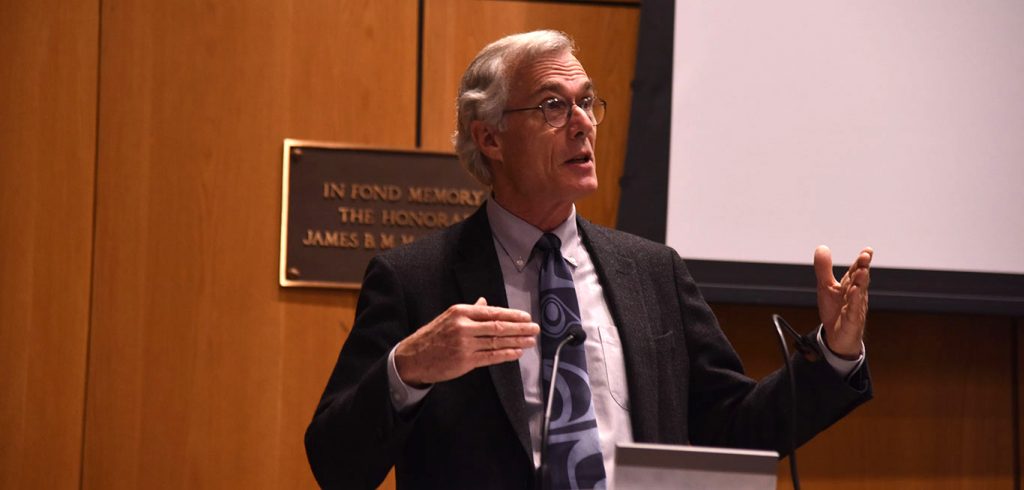To understand modern day capitalism, simply go back in time 414 years and head to Bantam, a port city on the island of Java in what is now Indonesia.
It is there, said Timothy Brook, Ph.D., that international legal frameworks that make capitalism possible were first hashed out by traders from the Netherlands, England, Portugal, and China.
In his March 8 lecture at Fordham’s Lincoln Center campus, Brook, a professor of history and the Republic of China Chair at the University of British Columbia, described what it was like for a 17th-century Englishman by the name of Edmund Scott to deal with competing cultural and legal norms in the city.
Brook’s lecture entitled “What to do When the Chinese try to Burn Down Your Warehouse?” dwelled on thorny legal cases that Scott faced while in Bantam.
The cases—the murder of a Dutchman, the warehouse fire referenced in the lecture title, and others—all brought to the fore questions about who had jurisdiction in the city, what the applicable law was, and who had authority to mete out punishment, he said.
In one case, the Dutch turned over a suspected murderer of one of their own to the king of Bantam. The king, realizing that the suspect was a slave of a Bantam aristocrat, gave him back to his owner, and ordered the owner to pay the Dutch a “bloodwit” of 100 pesos. The Dutch insisted that was insufficient, and a highly illuminating conversation ensued between them and the Bantam regent, said Brook.
When they were asked by the regent whose laws they obey while in a visiting country, they replied that when aboard their ships they were governed their own laws, but on shore they went under the laws of the country.
“The Dutch were acknowledging what we call territoriality—they are under the jurisdiction of the territory,” said Brook, author of Vermeer’s Hat: The Seventeenth Century and the Dawn of the Global Age, (Bloomsbury Press, 2014)
Brook said “bloodwits” had been phased out in Europe in the 13th century, so the Dutch refused to accept payment from the murder’s owner. They also had no standing to insist upon the death penalty for the murderer, so they asked instead for a written statement from the Bantam regent that would assure that an injury done to them would not go unpunished, despite their status as foreigners.
This last exchange, said Brook, exemplified the start of a long process of negotiation between different cultures, and the move toward “extraterritoriality—that is, the right to suspend the legal oversight of the place you’re in and deal with your own problems yourself.”
Extraterritoriality is the widely accepted maritime law today, he said.
“By the time you get to the 19th century, extraterritoriality has become the norm for Western colonial enterprises in Asia. The English in China and the Dutch in Java have their own courts and their own laws. They do not attend to the laws of the territories,” he said. “But if you go back to 1604, this is just starting to be formed and worked out.”
Having their own laws was key to Western merchants, he said, because for trade to flourish they needed to be able to predict what’s going to happen if someone from a territory tried to burn down their warehouse or kill their sailors.
“Capitalism may have emerged in Western Europe in one sense, but it emerged because Europeans were interacting with the rest of the world,” he said. “The turn of the 17th century is the pivotal point, because this is when the Asian and European economies start to link up.”
“Had capitalism stayed in Europe, it would not have become capitalism,” he said.
Brook’s appearance was part of the O’Connell Initiative on the Global History of Capitalism, an ongoing forum that includes guest lectures and research grants open to Fordham faculty and students.

